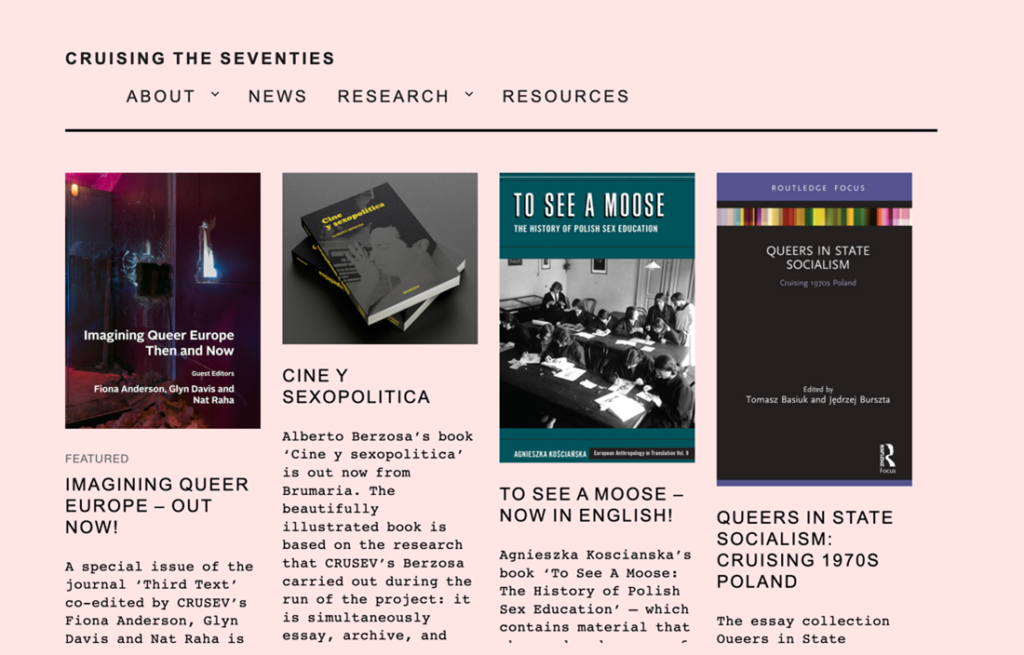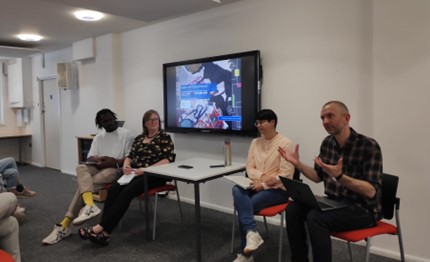Safeguarding LGBTQ+ heritage for the future
June is Pride Month – a time to celebrate the LGBTQ+ community and honour the legacy of activists and movements that have fought for equal rights. Although LGBTQ+ history is long and complex, comprised of distinct stories from around the world, many of these stories are not often told in mainstream narratives. Professor Glyn Davis of the Department of Film Studies re-examines these narratives, highlighting diverse perspectives to tell a fuller story of the fight for LGBTQ+ rights. His work addresses deeper questions – how is history told? What does that change about how we understand the past, and how we act on that understanding in the future?
The 1970s were a particularly significant period of LGBTQ+ history, commonly characterised as the genesis of LGBTQ+ liberation following the Stonewall riots in New York City. In 2016, Davis and Dr Fiona Anderson of the University of Newcastle built on their backgrounds in LGBTQ+ cultural and political history to question the simplicity of this narrative, asking what perspectives outside of the United States could offer to understandings of LGBTQ+ rights and history. This investigation formed the basis of Davis’ three-year research project, Cruising the Seventies: Unearthing Pre-HIV/AIDS Queer Sexual Cultures (CRUSEV). Davis and 28 collaborators across Europe drew on archival documents, interviews, and art and film to uncover the vast untold diversity of LGBTQ+ activism taking place in Europe throughout the 1970s.

One of these hidden dynamics was regional distinctions within countries. The team found that different perspectives on LGBTQ+ activism emerged between West and East Germany during the postwar occupation, and throughout individual geographical regions of Spain. Similarly, the project’s British team examined how legal shifts for LGBTQ+ rights had different ramifications across regions of the UK. Although the partial decriminalisation of homosexuality occurred later in Scotland than in England – in 1982, rather than in 1967 – this did not prevent the country from developing its own LGBTQ+ activist politics, with lesbian and gay groups working in collaboration with feminist and leftist organisations.
Another aspect of historical narratives the team sought to redefine was the tendency of historians to analyse LGBTQ+ rights on a country-by-country basis. Siloed views of LGBTQ+ rights in Spain or Germany became less fitting when considering the widespread movement of activists across national borders, and the expansion of the European Union taking place around the same time. Looking to the present, this perspective underscores how transnational networks can be used to support progress toward equality. As evident in this example, viewing LGBTQ+ rights and history from a global perspective provides a way to contextualise and inform future actions.
In terms of research methods, art and film offered unique and personal insights into the objectives of the assorted activists and groups that the team was researching: from archival media such as a documentary produced by the Gay Liberation Front activist group, to new films that emerged out of the project itself. For example, CRUSEV supported Karol Radziszewski, artist and founder of the Queer Archives Institute in Poland to produce Afterimages: a short film offering insights into the life of Ryszard Kisiel.
A video of Radziszewski discussing the Queer Archives Institute during his residency at Associação Cultural Videobrasil.
With archives featuring as a major component of Cruising the Seventies, Davis is now looking to examine the archives themselves and see what stories they can reveal about LGBTQ+ heritage and history. With colleagues Eliza Steinbock of Maastricht University and Juan Suárez of the University of Murcia, Perverse Collections: Building Europe’s Queer and Trans Archives (PERCOis a new project seeking to map the growth of LGBTQ+ archives across Europe, which range from national state-funded institutions to personal collections in individual homes. It asks the question: ‘how can we take lessons from the past 50 years of developing these archives, and use them to safeguard the future of all LGBTQ+ collections?’
Emerging from the project will be insight into how LGBTQ+ materials can be preserved and accessible to future generations, and how a sustainable model for LGBTQ+ cultural heritage can be put in place. The project seeks to identify a list of priorities for how museums can stay in conversation with the communities they represent as well as the general public, how materials can be interpreted and displayed for different forms of education, and what those changes can do for the continuation of LGBTQ+ heritage and culture. The project has been financially supported by the Joint Programming Initiative Cultural Heritage and Global Change programme, through its ‘Cultural Heritage, Society and Ethics’ funding stream.
PERCOL’s first event, “Queer and Trans Archives: Safeguarding Histories, Designing Futures” took place on Tuesday, June 20th at the in London, where a panel of three speakers from Norway, the Netherlands, and Germany discussed their experiences running archives and coordinating archival research projects. During and beyond Pride month, the work of Davis and his team continues to uplift LGBTQ+ heritage and history far into the future.

For updates on future events and emerging research, follow PERCOL on Twitter and Instagram.